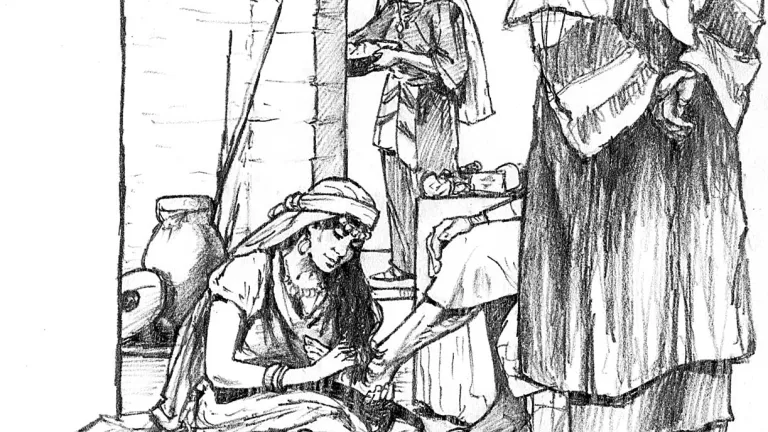What Would Jesus Do? Lessons in Friendship
What can we learn from the only Person who has ever lived a perfect life as a human being? How did He interact with His friends?
If someone asked you to describe Jesus Christ, which words would you choose? Son of God? Savior? Perfect?
What about "Friend"?
It's probably not the first word to come to mind, but Jesus had friends and was a friend while He lived on earth. He describes some of His companions as friends in Luke 12:4, in John 15:13-15 and in other passages.
Since Jesus is our role model, we can learn from examples He set with His friends and use them to improve our own friendships. Let's look at His relationship with Lazarus, whom He describes as a friend in John 11:11, and Lazarus' sisters, Martha and Mary, whom Jesus also loved as much as their brother, according to John 11:5.
Friends must interact
Jesus visited Mary, Martha and Lazarus several times. Luke 10:38-42 records one occasion and John 11 and 12 describe two others. The Bible notes in John 12 that Jesus came to their home in Bethany six days before Passover, so it appears that He left there after resurrecting Lazarus (as recorded in John 11) before returning for this later visit.
Bethany was about two miles from Jerusalem and much farther from Jesus' home base in Galilee. It was not exactly a short trip in the era of foot travel. He didn't just drop in as an afterthought on his way to the market. It was an effort to get there—especially since He had previously been threatened in the area (John 11:8).
Interaction is one of four key behaviors friends use to maintain their relationships, according to a study by Debra Oswald and Eddie Clark (Personal Relationships, Vol. 10, 2003, pp. 187-196). The study, which surveyed 249 first-year college students at St. Louis University, determined that high school best friends who performed activities together after starting college were more likely to be best friends at the end of the school year.
In Jesus' time, there were only a few ways to interact—writing letters, passing on greetings, or face-to-face visits. Today, we have more choices: making phone calls, writing e-mails, sending text messages, communicating by other electronic media (instant messaging, streaming audio and webcam conversations, for example) along with, as before, sending letters and just spending personal time together.
Experts agree that interaction doesn't always need to be face-to-face. Initially, Oswald and Clark expected friends' physical proximity to be a factor in their closeness. They were surprised to find it wasn't an issue. As long as there was a high level of communication, distance didn't matter. So your relationship with a friend you met at summer camp isn't doomed to fail if you live in Wisconsin and she's in California.
Friends can learn from one another
During one of Jesus' visits, other people came to Martha's house to hear Him speak. In Luke 10:40-42, we see that Martha was busy serving the people while Mary sat with the guests, listening. Frustrated, Martha asked Jesus to tell Mary to help her. Instead, He explained to Martha why Mary had her priorities right and had correctly chosen Christ's spiritual teaching.
We can't all be blessed with Martha's circumstance of having as a close friend the human Jesus, the only perfect man with perfect judgment. But we can still learn from our friends. Chances are good that we already value their opinions and think they're pretty smart—after all, they chose us as a friend!
A well-known passage from the book of Proverbs tells us that just as iron sharpens iron, friends can prod each other to grow (Proverbs 27:17). In verse 9 of the same chapter, the author compares advice from a friend to a pleasant, fragrant perfume.
And even if you decide your friend is wrong, you can still remain friends. The Bible doesn't tell us whether Martha was angry or immediately accepted Jesus' correction. But they obviously remained friends after this incident, since we see them still interacting in John 11 and 12.
Friends support one another in times of need
Jesus made it a priority to be with Mary and Martha after their brother died. He didn't go immediately after getting the news Lazarus was ill so that He could perform the great miracle of resurrecting Lazarus. But when the time was right, He went not only to bring Lazarus back to life but also to comfort Mary and Martha (John 11:17-32).
Jesus didn't have to meet with the sisters. All He really needed to do was resurrect Lazarus. But He went out of His way to talk with them personally so He could support them at a time when they were hurting—as well as to help their understanding.
Supportiveness is another key behavior friends use to maintain their relationships, according to the study by Oswald and Clark. They determined that providing friends with emotional support increased the subjects' satisfaction with the friendship and their commitment to the relationship itself.
Romans 12:15 tells true Christians to "weep with those who weep." Jesus gave us His example to follow in John 11:33-35. This passage reveals that Jesus was troubled by Mary's crying over her brother's death to the point where He Himself wept. Others assumed He was crying over Lazarus' death, but Jesus had no reason to cry about that. He had known that Lazarus would die and knew that He would bring him back to life in just a few short minutes. His emotions were stirred by the pain and sorrow of His friend and of the others gathered there.
God wants us to support our friends in a right and godly way. In fact, 2 Corinthians 1:3-4 tells us that He Himself comforts us so that we may comfort others. Following this command can only strengthen our relationships with our friends and with our Creator.
Mary, Martha and Lazarus had a unique opportunity to be friends with Jesus Christ while He walked the earth. But we can still be friends with Him today.
In John 15:14, He tells us how: we must do whatever He commands. It's clear that Jesus wants to be our friend. He laid down His life for us before we were even born (John 15:13). He's already made the commitment. The rest is up to us. VT





